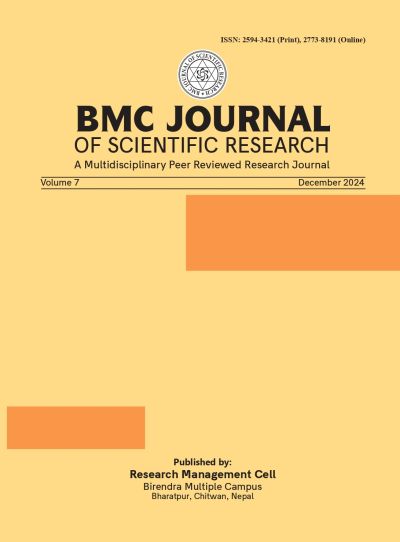Impact of Anthropocentrism in Robert Frost’s “A Brook in the City”: An Eco-critical Reading
DOI:
https://doi.org/10.3126/bmcjsr.v7i1.72948Keywords:
Anthropocentrism, environment, human exploitation, human-nature reciprocity, eco-criticismAbstract
This article on Robert Frost’s poem “A Brook in the City” analyzes the exploitation of nature resulting from human encroachment. The poem presents the transformation of the brook from “an immortal force” to a mortal one with the advancement in science and technology. The poem evokes images of a serene brook from the past and contrasts them with scenes of a modern city, drawing a comparison between the two. The article uses eco-critical perspective to examine the destructive consequences of human intrusion on nature, linking these ideas with concepts from Val Plumwood’s “The Blindspots of Centrism and Human Self-enclosure”, and Arne Naess’ “Deep Ecological Movement: Some Philosophical Aspects”. Characteristically, the primary interest of eco-criticism has focused on literary representation of the Culture/Nature relationship, especially on the current ecological crisis and possible ways for its solution. The poem “A Brook in the City” gives a picture about the destruction of nature and Frost’s critique of massive exploitation of nature due to anthropocentric attitude on human beings. The findings highlight Frost’s implicit warning against the ecological harm caused by prioritizing development over environmental harmony. The study concludes that the poem serves as a poignant critique of humanity's exploitative tendencies, urging reflection on the need for a sustainable relationship with nature to address the ecological crisis.
Downloads
Downloads
Published
How to Cite
Issue
Section
License
Copyright (c) 2024 Research Management Cell, Birendra Multiple Campus

This work is licensed under a Creative Commons Attribution-NonCommercial-ShareAlike 4.0 International License.




